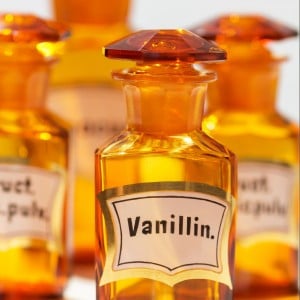Isobionics is a biotech from the Netherlands that specializes in synthetic bio-production of natural essential oils and flavorings for use in the food, perfume and detergent industry. On the other hand, Evolva, from Basel, are estimated to produce up to $500M worth of synthetic vanilla essence for the industry each year. Using bacteria and yeast to produce hugely important ingredients such as patchouli, valencene and vanillin has meant these industries haven’t collapsed due to over-demand and poor crop yield of these essential oils.
Patchouli is one of the essential oils which constitute the traditional perfume, and today the fragrance industry is still strongly dependent on its characteristics for cosmetics, air fresheners and certain laundry detergents. Traditionally it is harvested from steam-extraction of the mint-like plant Pogostemon cablin, which is farmed in many counties such as India and China.
Historically, patchouli was a symbol of great luxury and wealth, which is speculated to have been born due to its use on the silk road as an insect repellent during trade transport of fine silks and textiles during the 18-19th century. And with increased trade of luxuries in the 19th century, came the increasingly elaborate concoctions of victorian perfumes, using many other expensive essential oils layered on top of a patchouli base.

However, the scaling up of demand for perfume (no longer considered a luxury reserved for the upper class in society) meant the industry came to rely on the slightly unreliable source for essential oils in traditional farming and extraction techniques. Indeed, the sudden scarcity of patchouli after a crop-fail one particular year made the Western market price soar, stopping many patchouli-dependent manufacturers in their tracks.
Now, biotechnology has shown that this doesn’t have to all be so expensive. Synthetic alternatives to the traditional steam extraction of plant material has dramatically slashed the costs of essential oils. Isobionics is one such biotech which supplies the industry with cheaper and more easily producible essential oils for flavoring purposes as well as smelling good.

Their focus products include valencene, an extremely common additive of orange-flavored beverages; beta-elemene, produced by ginger and used for flavorings; and nookatone, another drink additive from grapefruit. Isobionics insist these are all-natural additives for the food and drink industry, seeing as they are all secondary plant metabolites.

Similarly, other such fragrant and popular ingredients like vanillin, extracted from vanilla beans, can cost around $1500 per kilogram. Switzerland‘s Evolva is another biotech which answers to this industry qualm.
Synthetic production of vanillin instead uses fermentation of genetically modified yeast strains, dramatically reducing costs to around $10-20 per kilo. This explains why around 99% of the market vanilla extract is now dependent on biotechnological extraction as opposed to vanilla bean sources, which Evolva estimates to be worth €573M.
Evolva has done this using a variety of gene-editing technologies. By inserting specific genes into Saccharomyces, they can use this cheaply available organism to synthesize the desired compound during fermentation. By then silencing all the other non-essential biosynthesis pathways, the yield of the product can be improved.
Finally, Evolva has developed a proprietary ‘toolbox’ of Biomolecular modification techniques to simplify the extraction of the products from the fermentation broth. These include glycolysation, use of cytochrome P45 enzymes and insertion of ‘transporters’ to allow efficient leakage of the products from the yeast cells, of which Evolva has an extensive library.

Other projects include the search for an alternative and sustainable source for sandalwood (the bog-standard incense) and the spice saffron, which is infamously expensive and reminiscent of the crowded and the fragrant depths of the Souqs of Mahgreb region in Northern Africa. Given its desirability in cooking, other substitutes such as turmeric (a member of the ginger family) or the flavorless safflower have simply not sufficed.
However, despite the benefits the competition is fierce, one major US competitor being Amyris, and opposition also includes the anti-GMO rally, who fail to accept this alternative method of producing natural essential oils as kosher, but that is a whole other discussion.





